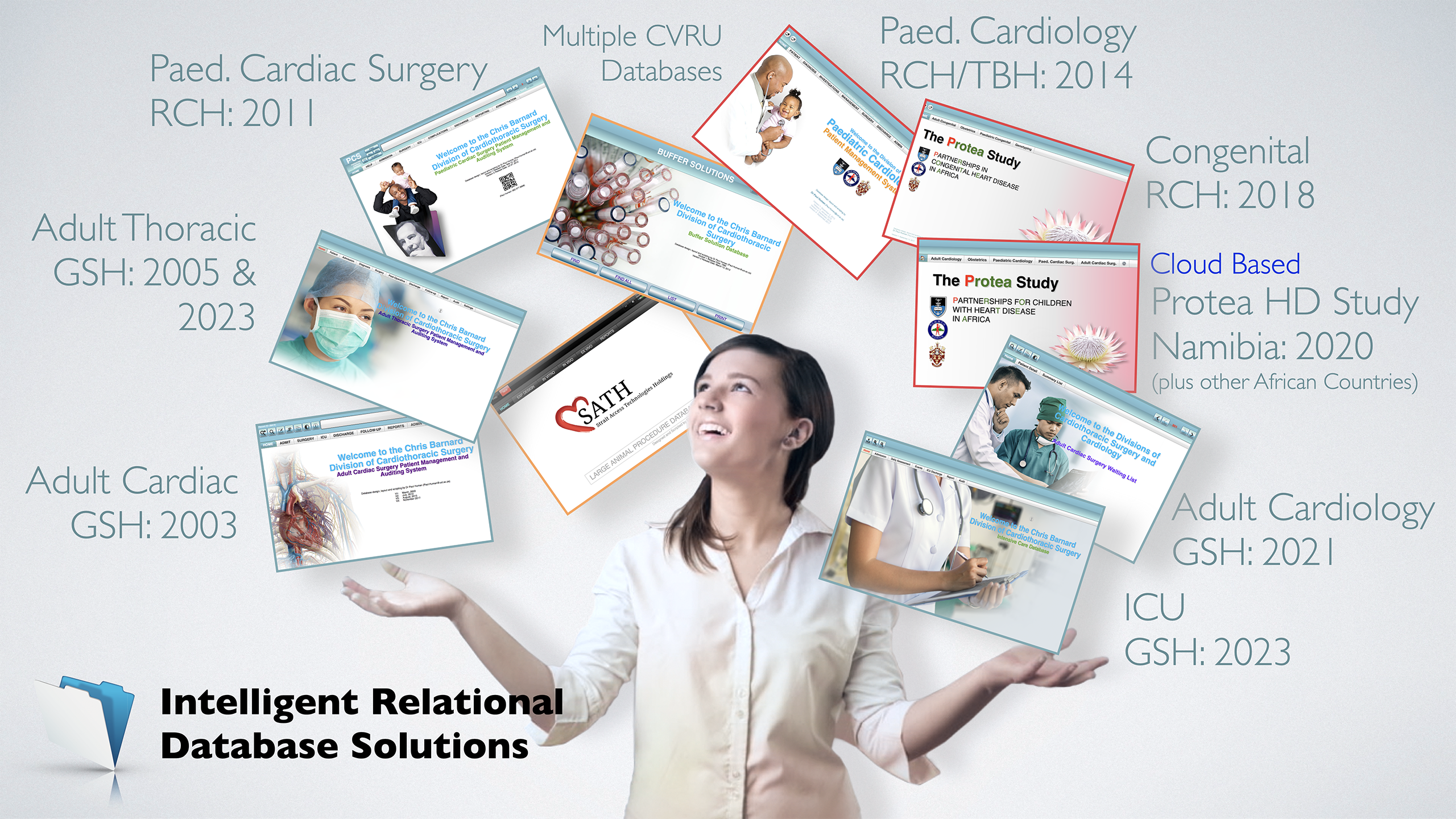
During the early 1990s, due to the multidisciplinary nature of research being performed in the Cardiovascular Research Unit and due to the high volume of image-based data being produced, a relational database system was initiated by Professor Paul Human.
The software application chosen for this purpose and subsequently known by the Filemaker trademark, is a major subsidiary of Apple Inc. It is used internationally in all sectors of industry, including the health sector. It supports both the Apple and Windows platforms making it ideally suited for use in academic institutions. The current version of the software, version 13, is in use by the Chris Barnard Division of Cardiothoracic Surgery. A dedicated server serves the multitude of database solutions developed by Prof Human via Filemaker clients on workstations and, more recently through the concept of concurrent licensing, on IOS devices (using Filemaker Go) and in browsers running on multi-platform computers and tablets. Data security and integrity is paramount and the system has hierarchal access control and stringent backup systems in place. Housed in the Chris Barnard Building, the system is supported on UPS and by the building generator. A second fallback backup array is housed in the Division’s clinical wing at Groote Schuur Hospital. Through scripting, highly intelligent solutions are possible which control data accuracy.
In 2003, Prof Human developed the first of four clinical patient management systems, namely for adult cardiac patients. Two years later, in 2005, a similar adult thoracic solution was developed and, in 2011, after bandwidth was increased to Red Cross Children’s Hospital, a paediatric cardiac system followed. More recently, in 2014, at the request of the paediatric cardiologists, a cardiology solution was developed to also address the problems of managing patients having undergone palliative repair and placed on a surgical waiting list. A significant contribution towards upgrading the server and the jump to version 13 was made by the Red Cross Hospital provincial administration in 2013. This has been expanded to include an adult Cardiology Waiting List, an ICU database and complete revamping of the Adult Thoracic Database in 2023.
The clinical patient management solutions generate grammatically correct operation notes and discharge letters. A chart reporting section allow custom on-the-fly reports to be generated based on the current found set. The system also allows interrogation through Open DataBase Connectivity and SQL type queries. This system is indispensable for both patient management and research. More recently, a GIS capability has been added to provide relevant information to, not only the Division, but to the Hospital Administrations as well.
Data integrity checking represents the most important facet of database management and this is compounded by the complexity and diversity of cardiothoracic procedures performed. A careful balance between too many data fields and too few is achieved through experience but, since it is impossible for senior consultants to manually validate in excess of 100 surgical cases per month, an intelligent automated policing system has been developed which intuitively flags records based on a series of complex rules. The system then emails responsible surgical registrars and perfusionists highlighting any inaccuracies or omissions. The system timestamps such notifications and, if not adequately corrected, will then escalate these notifications to junior consultants, then to senior consultants, then to the surgical director and finally to the head of division. Additional scripting to highlight errant fields to the data capturers within the database layouts on-the-fly based on these predefined rules have helped to dramatically improve integrity but this is reinforced by the escalation strategy now employed.
The system is constantly being updated to incorporate new features as they are released by Filemaker and to make the layouts optimally compatible with portable devices. Diagnostic and procedural codes and risk scoring systems are similarly updated and/or improved.
Professor Human also is responsible for statistical analysis and data mining. Propensity score matching and partition modelling are two methods that have opened an essential door to allow retrospective analyses of patient data for approved research studies and provide otherwise inaccessible insight into the outcome and better management of the indigent cardiothoracic patient.